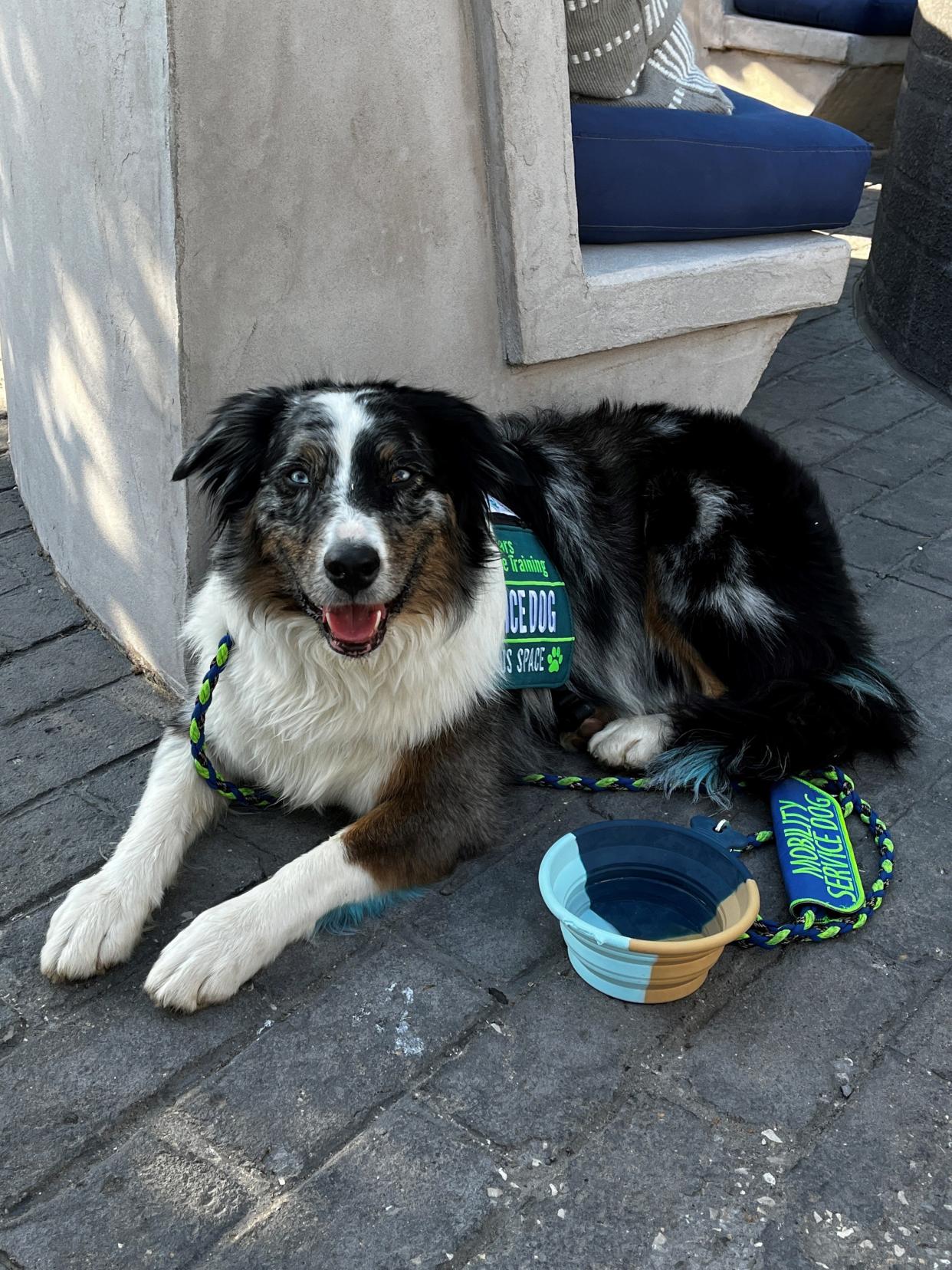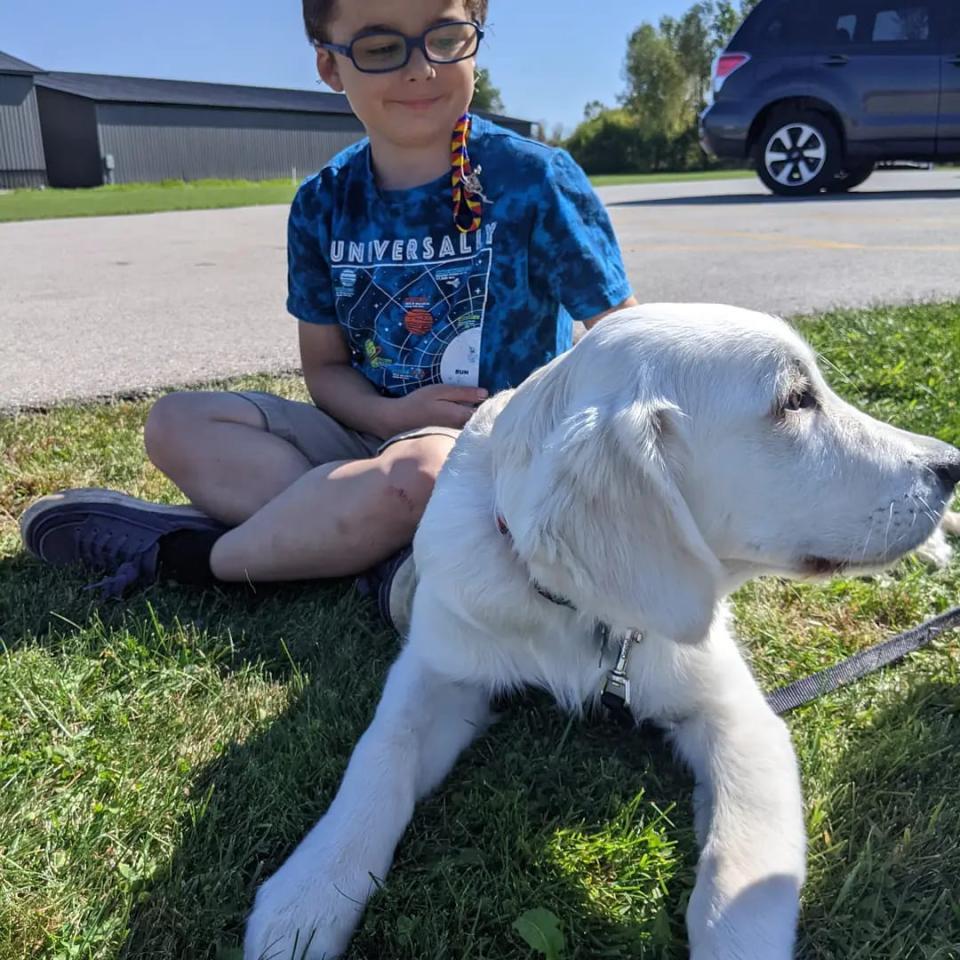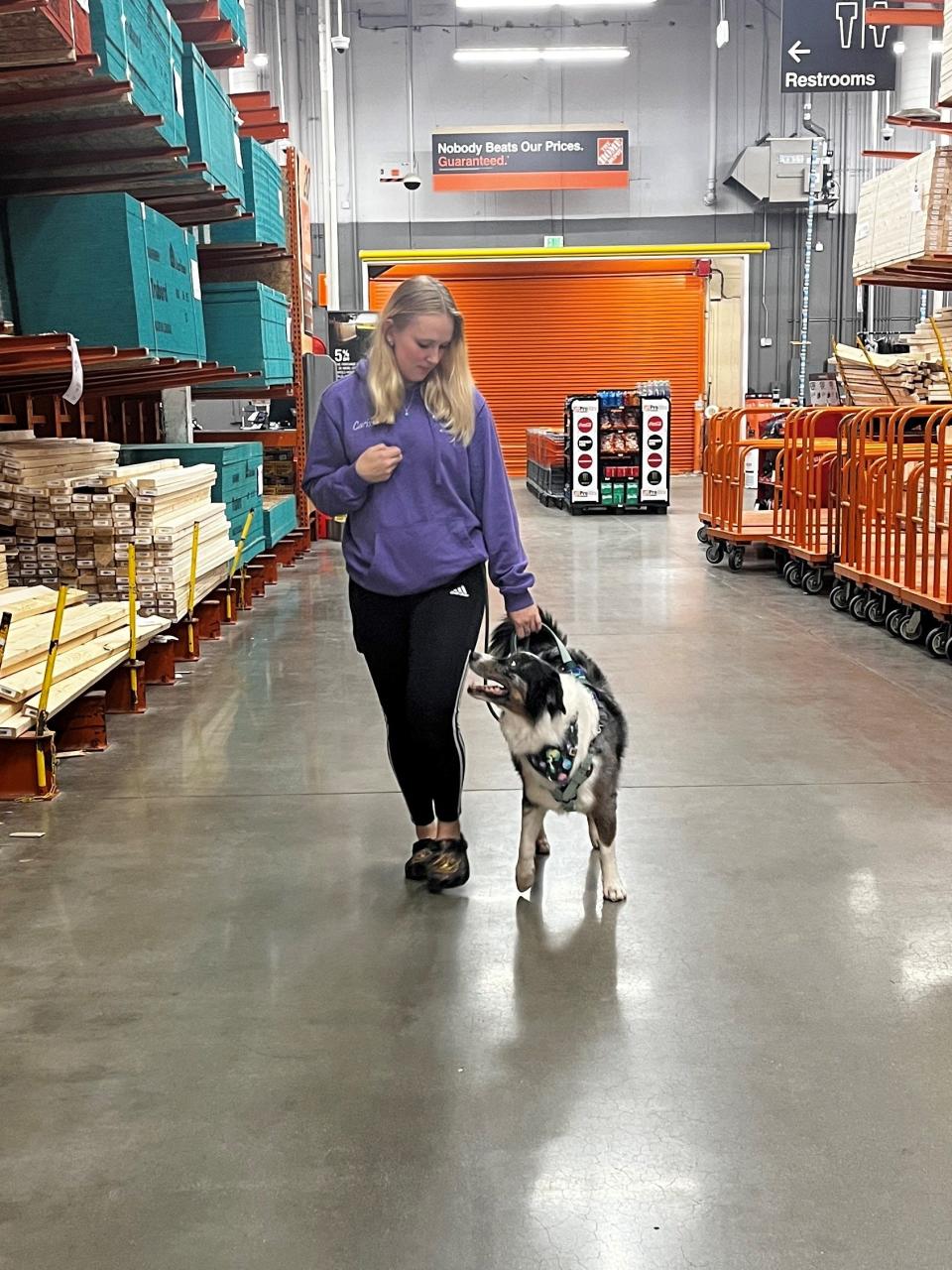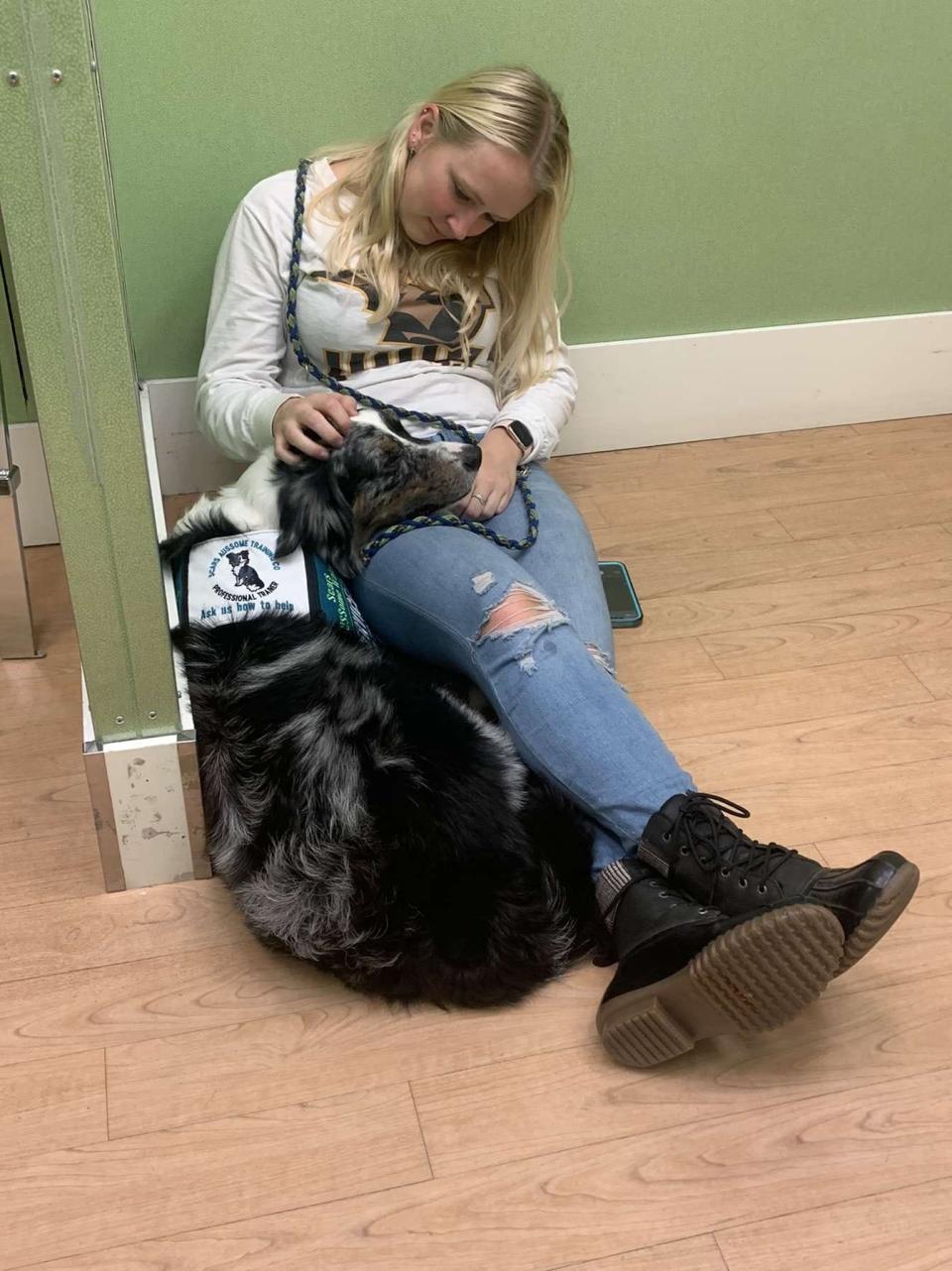Fond du Lac service dogs need space to work in public, and distractions could be dangerous, handlers say

FOND DU LAC — What do service dog handlers wish their community knew about their dogs? They're hardworking animals, and should not be messed with.
According to the Americans with Disabilities Act, service animals are dogs individually trained to do work or perform tasks for people with disabilities, and they accompany their handlers into public spaces where their support is necessary.
Some of these tasks can include guiding someone who is blind, alerting someone who is deaf, pulling a wheelchair, alerting and protecting a person having a seizure, reminding a person with mental illness to take prescribed medications or calming a person with post-traumatic stress disorder during an anxiety attack.
For instance, Lara Henry's 7-year-old son Sol has Duchenne muscular dystrophy, a muscle-wasting disease that affects his ability to walk. His service dog, Waffles, is being trained to "brace": planting his front feet so Sol can lean against him when he loses his balance, or use him to stand back up if he trips and falls.

Waffles is also being trained in pressure therapy to give Sol comfort, and, because the medication involved leads to high risk of breaking a bone, Waffles will eventually be trained to "go get help" from an adult if Sol has a serious fall, Henry said.
In the event that Sol will need a wheelchair, Waffles will be retrained to focus his support on picking up items, opening doors, turning lights on and off, and so on.
Henry said Waffles goes just about everywhere Sol goes, except for school — for now. While her family's experience in Fond du Lac with Waffles has been generally very good as far as businesses not turning them away and other people respecting Waffles's vest and leaving him alone to do his work, there have been incidents of people petting him without asking.
Service dogs' roles in public spaces are for support of their handlers, not entertainment, and being touched, talked to or otherwise distracted could keep them from doing their jobs, putting their owners in danger.
"You wouldn't mess with someone's wheelchair or (oxygen) tank, so please don't mess with their service dog either," Henry said.
How are service dogs navigating Fond du Lac? Outside distractions could prove dangerous.
Carissa Tank, owner of Scar's AUSSome Training and handler for her own Australian shepherd service dog Scar, said some of the biggest issues she faces in public with a service dog include not only distractions from people, but also distractions and attacks from untrained dogs.
"So many people have brought their pet into stores, and the dogs are poorly trained and run up to our hardworking dogs causing them to take focus off their handlers," she said. "Pets barking, lunging, or running to sniff our dogs can distract them from an alert that can land us in the hospital."

In Tank's case, Scar is trained to stop anxiety responses like scratching or knee shaking, use deep-pressure therapy for panic attacks and alert to a high heart rate above 145, where he will elevate her legs with his body while she is laying down.
Many of the bad experiences she's had in Fond du Lac are rooted in lack of information or misinformation, and as a trainer of service dogs, therapy dogs and more, she's happy to educate, but is not always met with openness.
According to the ADA, staff cannot turn away customers or refuse service for service dogs or ask for medical documentation or other proof of disability or training. Allergies, fear of dogs or proximity to food service aren't valid reasons to turn away someone with a service dog, and staff are allowed to ask two questions: whether the dog a service animal required because of a disability, and what work or task the dog has been trained to perform.
Under the same laws, a service dog must be under control of the handler and be leashed, harnessed or tethered unless doing so would interfere with the dog's task or the individual's disability, in which case effective control could look like voice or signal commands.
However, if a service dog is out of control and the handler is not taking effective action, or if the dog is not housebroken, handlers can be asked to remove their service dogs from the premises, though staff are then required to offer that person the opportunity to obtain goods or services without the animal’s presence.
In Fond du Lac, Tank has seen several instances of people faking service dogs in stores and other businesses, and it's these untrained dogs that misbehave and try to attack her and her dog.

"It’s really sad since so many people think it’s fun to bring a dog everywhere when really (service) dogs have thousands of dollars into them and 150-plus hours into training for their disabled handlers," Tank said. "These dogs are lifelines."
Businesses often stop after asking whether a dog is a service animal, and won't ask what work the dog has been trained, for fear of being sued for asking too many questions, making it easy for people to say any dog is a service animal, she added. Additionally, many people will spend money for online certification, which the ADA doesn't recognize as valid.
Vests on the dogs are also not required by the ADA, though many handlers use them or other indicators to make it clear that the dog is there as a medical device, not for fun.
Rhoda Rehn, one of Tank's clients with a service dog-in-training for detecting glucose levels and PTSD responses, said many people respect the vest, and parents will even educate their children on reading the harness and not touching her dog.
"It is very beneficial for us when parents take notice and explain to their children what role service dogs play and that they are working, therefore they are not to be played with," she said.
Tank added that people should address the handlers first, not the dog, since people usually wouldn't talk to or pet other medical equipment, like wheelchairs.
"Compliments are fine but barking and baby talking to the dog, or screaming 'puppy' across a store doesn’t help," she said.
Other types of support dogs have important roles, but their differences are key
Service dogs are the only animals with public rights by ADA law. Emotional support dogs and other animals grant rights for non-pet housing, but are specifically not qualified as service animals by the ADA.
Therapy dogs, who provide comfort for multiple people at once, are only allowed in places like nursing homes, schools and hospitals, not stores, Tank said.
She said to leave pets at home, not only to minimize distractions for the tasks service dogs are doing, but also because public spaces stress out the pets in addition to everyone else involved.
Henry added that Waffles cost $22,000, fundraised by the community, and trained for two years, all of which could be reversed with the wrong interaction.
"If he was to be attacked in public by someone's untrained dog he could be essentially ruined for working, and we would have to go through the entire process again," she said.
Here's how Fond du Lac is helping its hardworking dogs and other disability accommodations
In honor of Fond du Lac's first dental therapy dog at Boudry Dental, the Bailey's Gift Fund through the Fond du Lac Area Foundation raises money for resources and training for service dogs, therapy dogs and facility dogs for places like the local elementary schools.
Dentist Tammy Boudry got approval and licensing in 2015 to use her hypoallergenic Goldendoodle Bailey by patients' request as a dental chair companion, and after Bailey died in 2019, Boudry started the fund to share the benefits of service, therapy and other working dogs through individual donations and the proceeds from whitening treatments at her office.
Last month, the community also came together for the Fond du Lac County Sheriff's Office police dog Iro, who was injured in a shooting and has been recovering ever since.
Since the department's police dog program is fully donor funded, Rosenow Elementary School started a "Go Blue for Iro" day to raise money for his recovery. Many other schools and local businesses joined in on the cause for that day and the rest of October, whether in the form of regular donations, "Art for Iro" posters or specials, like Faris Popcorn's Go Blue for Iro popcorn blend.
Additionally, for Henry's son Sol and other local children with disabilities, the Rosenow parent-teacher organization has been raising money for an inclusive playground at the school in a campaign called "Play4All."
For more about the campaign, playground and upcoming fundraisers, visit the Play4All FdL Facebook page.
For more about Scar's AUSSome Training, visit scarsaussometraining.godaddysites.com. For a peek at the dogs in training and how they're trained, visit the Scar's AUSSome Training Facebook page.
Daphne Lemke is the Streetwise reporter for the Fond du Lac Reporter. Contact her at dlemke@gannett.com.
This article originally appeared on Fond du Lac Reporter: Fond du Lac service dogs: Many interactions are dangerous for handlers

